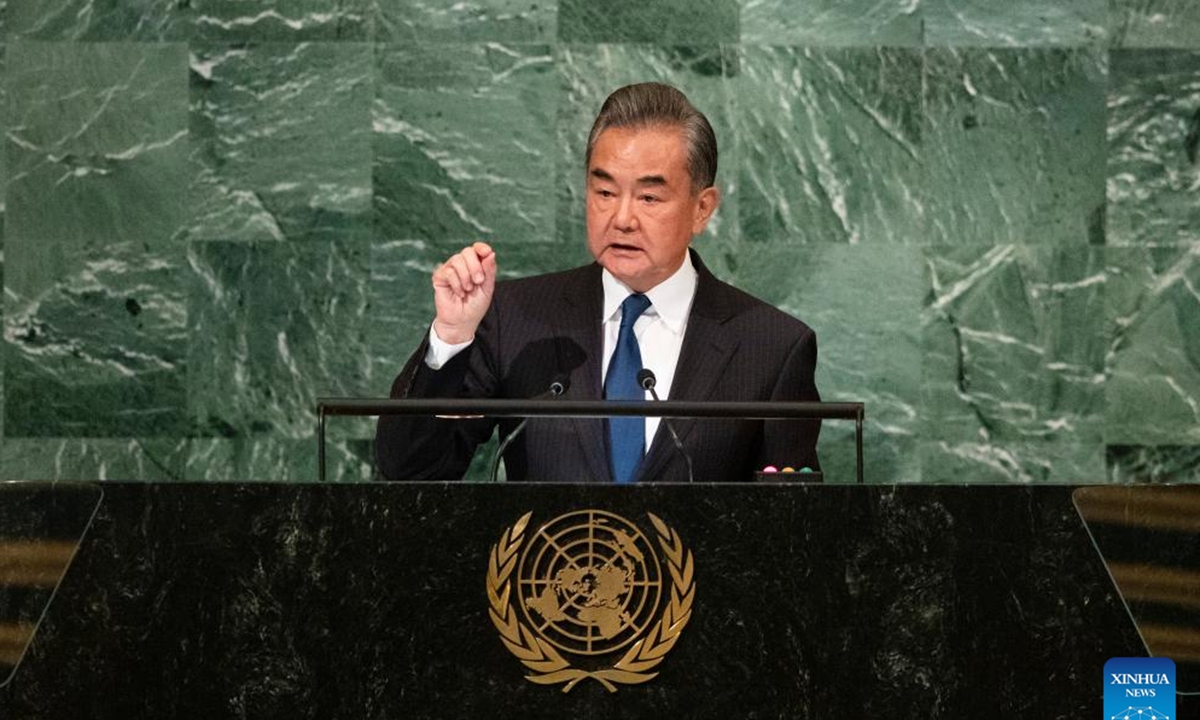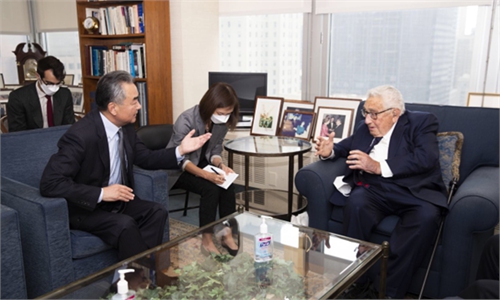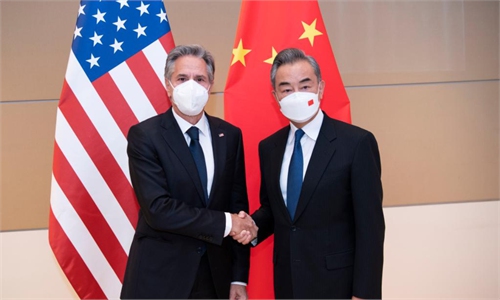Delegates of many countries waiting for Chinese delegation shows general aspiration: Global Times editorial

Chinese State Councilor and Foreign Minister Wang Yi delivers a speech at the general debate of the 77th session of the United Nations (UN) General Assembly at the UN headquarters in New York, on Sept. 24, 2022. Photo: Xinhua
As the general debate of the 77th session of the United Nations (UN) General Assembly kick-started this week, relevant diplomatic activities have also been intensively conducted in New York. The General Assembly convenes annually but it has appeared to be particularly special this year. At such a historic juncture when geopolitical competition is fierce and the world economy is facing a recession, what statements and performance will China make on the UN stage? The world has paid great attention to it and had high expectations, while Chinese diplomats have responded to this with a whirlwind of activities and high-quality dialogues.Over the past week, China has held more than 40 bilateral and multilateral activities. Some observers say that the Chinese delegation may be one of the busiest delegations during the UN General Assembly meetings. We all know that the more severe and complex the international situation is, the more important for countries, especially major powers, to maintain communication and interaction. China's increasingly proactive diplomacy has actually promoted the formation of a more just and fairer international order, making irreplaceable contributions to regional and world peace and stability.
It's fair to say that China's diplomacy has the greatest stability and continuity among all major powers. At the general debate of the UN General Assembly, Chinese State Councilor and Foreign Minister Wang Yi laid out a six-point proposal on how to respond to the requirements of the times, grasp the trend of history, and jointly build a community with a shared future for mankind. He said countries must uphold peace and oppose war and turbulence; must pursue development and eliminate poverty; must remain open and oppose exclusion; must stay engaged in cooperation and oppose confrontation; must strengthen solidarity and oppose division and must uphold equity and oppose bullying. The six-point proposal has clearly clarified China's position on a series of major international issues.
How have representatives of other countries reacted to the proposal? A very convincing detail is that after the general debate ended, delegates of many countries waited outside the venue to shake hands and communicate with their Chinese counterparts to express their support and approval for China's proposal. Another interesting detail is that after Wang delivered his speech, some US and Western public opinion jumped out and claimed that Wang was targeting the US when he said "he who instigates a proxy war can easily burn his own hands" and "protectionism can only boomerang."
There is a profound cause-and-effect relationship for the self-awareness of US and Western public opinion and the fact that representatives of more countries spontaneously waited for the Chinese delegation after the meeting. Certain major countries regard the international public issues as their own yo-yo in their palm, while taking the global stage as their own karaoke hall. Other countries have been unwilling to be manipulated by them for quite a long time.
Three years ago, former US president Donald Trump claimed at the UNGA that "The future does not belong to globalists," while insisting that the US would never ratify the UN arms trade treaty. At the same location three years later, current US President Joe Biden called on countries to "abide by the UN Charter" and promoted "the vision of a free, open, secure, and prosperous world." Now, when independence is deeply rooted in the hearts and minds of people, how many sovereign countries among the 193 UN member states, apart from hard-core US allies, are still willing to follow the baton of American interests nowadays?
The common pursuit of all countries in the world cannot be swayed by the selfish issues of individual countries. The general aspirations of people of all countries cannot be replaced by the narrow interests of a small circle. The core agenda of this era is neither the "democracy vs autocracy" nor the deliberately strengthened bloc politics and camp confrontation, but global development and global security. The reason why China's proposition has aroused the general resonance is that it has clearly stated what everyone wants to say. The reason why our circle of friends continues to expand is that China has always been a builder of world peace, a contributor to global development, a defender of international order, a provider of public goods, and a mediator of hot-spot issues.
Even if China's stance is so clear and firm, there are still nitpicking. Certain countries and some politicians frequently express their "confusion," just because China did not take sides in the Russia-Ukraine conflicts, nor did it yield to shameless pressure according to their well-designed playbook. We can only conclude that they have put up a confusing face to create and manipulate the global public opinion to smear China's image. In the meantime, they could look for legitimate and rational excuses for the West's attacks. But as a major country, how can China dance to their beat? And we believe clear-minded people are the mainstream in the international community.
It has been noted that China once again stated its solemn stance on the Taiwan question at the UN General Assembly, "Any scheme to interfere in China's internal affairs is bound to meet the strong opposition of all us Chinese, and any move to obstruct China's cause of reunification is bound to be crushed by the wheels of history." China's diplomacy has always treated friends who seek peace, cooperation and unity with smiles, but reacted strongly to forces that provoke and undermine our core interests. These two distinct attitudes are parts that form China's certainty.


